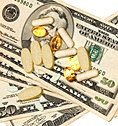Dr. Rogers goes on to say, "To compound our problem of declining nutrient status in this century, nutritional depletion is not readily recognized because of many reasons:
(1) there is not interest in it because it is a non-prescription item, so the physician has no power over its use; and (2) pharmaceutical companies cannot patent the products to make a profit. Therefore, there is little interest in nutritional therapies, nor is there money for research. In reality, a single deficiency (because it's important in a variety of enzymes) can manifest as a variety of symptoms."
According to Dr. Rogers, if the body is deficient in some nutrient or substance in an area of the body, it will "rob Peter to pay Paul." In other words, it will steal whatever it needs from one place to put it somewhere else. She calls this "auto-cannibalism." And the results are disastrous.
 THE HIGH COST OF GOOD HEALTH
THE HIGH COST OF GOOD HEALTH
While organic supplements may cost more than their generic counterparts, they are ultimately a better investment for your health.
Our soils are depleted and depleted soils do not produce healthy, nutrient-rich plants. It's also a fact that crops produced in depleted soils are more prone to the invasion of insects, viruses, fungi, etc. It's important to recognize that insects and infectious organisms were designed to get rid of unhealthy vegetation, and they typically do not attack truly healthy plants. Our industrialized (high-tech) methods of farming have not only depleted our soils, but also have created a vicious cycle, which requires pesticides to protect the unhealthy crops grown in depleted soils. And who suffers? We all do!
Since we are not consistently receiving life-giving, life-sustaining, organically bound carbon in either our food sources or in our nutritional supplements, what are we to do?
Go organic as much as possible.
First, as much as possible, we must be diligent in purchasing foods that are certified organically grown. However, that is not always feasible for the consumer and, in fact, is not enough.
Second, we must eliminate from our diet the processed and synthetic foods that are so prevalent. Even then, there always is a lack of nutritional completeness - hence the need for proper supplementation.
We must be certain that the ingredients in the nutritional supplement we choose are of the highest quality and are ultra-hypoallergenic (non-allergenic). They must not contain synthetics, inorganic and inert (dead/synthetic/toxic) substances, as well as the following: colloids, fat, cholesterol, wheat (gluten), corn, yeast, soy, dairy, eggs, nuts, caffeine, shellfish, animal products, artificial colors, flavors or additives, preservatives, pesticides, herbicides, insecticides, antibiotics, chemicals, binders, fillers, coatings, excipients, flow agents, starches, or salicylates.
So, what kind of a multivitamin should it be? And how much should you expect to spend to get a good-quality supplement?

